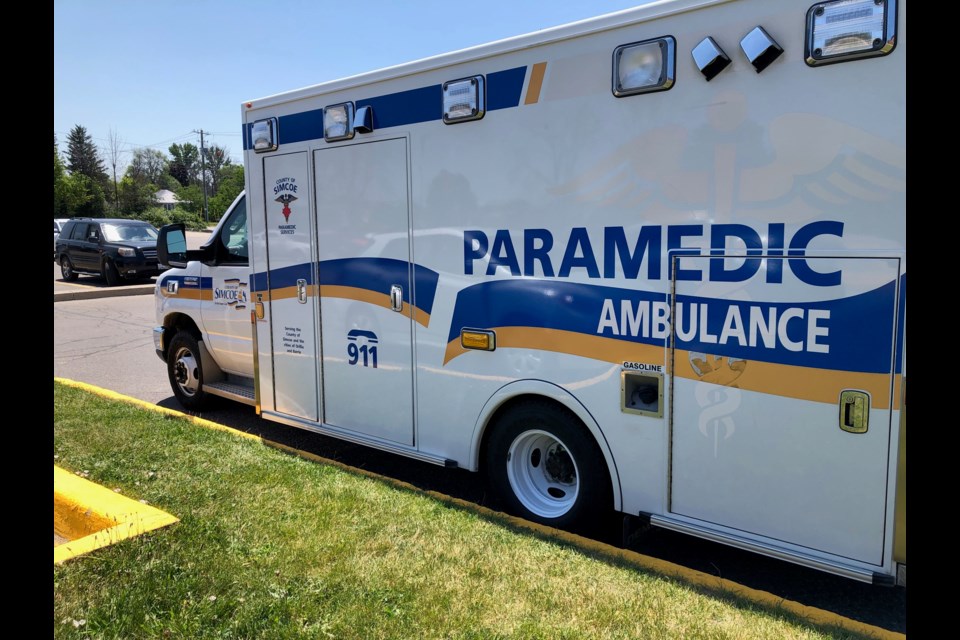Plans to direct funding only to hospitals in Barrie and Orillia to support the County of Simcoe Paramedic Services (CSPS) Dedicated Offload Nurse Program had some county councillors wondering why other community hospitals did not make the cut on Tuesday.
Late last year, county staff was informed of additional Dedicated Offload Nurse Program one-time funding of $374,734 — bringing the total to $506,412 — for the County of Simcoe's 2022-23 fiscal year in support of the new service.
This dedicated funding for hospitals allows them to place a nurse in their emergency departments to help with the flow of patients upon paramedics' arrival, Jane Sinclair, the county’s general manager of health and emergency services, explained during a recent committee-of-the-whole meeting.
As a result of the new funding, county officials are recommending an expansion of offload nursing support to Orillia Soldiers’ Memorial Hospital (OSMH) as well as Barrie's Royal Victoria Regional Health Centre (RVH).
Wasaga Beach Mayor Brian Smith expressed his dismay that all of the funding would be allocated to hospitals in those two cities, noting they tend to have the longest offload times in the region.
“The issue I have here is we have two large hospitals that are obviously very busy and are provincially funded ... so I am not so sure this is the responsibility of the county," he said.
"But we also have many other hospitals in the county that are also struggling a great deal with staffing issues, and specifically offload times," Smith added. "My concern is we have 16 other municipalities in the county who are continuously paying through (development charges) and what not to the county, yet the folks in our communities are faced with slower ambulance times, which we know are often because of very slow offload times.”
Ambulances in those smaller municipalities are often tied up in the larger cities, said Smith, adding he was recently made aware of a situation where a resident waited more than 30 minutes for an ambulance because both of the local two ambulances were tied up — one in Newmarket and one in Toronto — transporting patients and were unable to leave.
“I would like to see something come forward that speaks to where we are at with offload times today," Smith said. "I really think we should be looking deeper into this to ensure the citizens of Simcoe County and our other 16 municipalities are not being shortchanged with not getting the proper services they require.
"We know ambulances can sit up to three hours, and in Barrie that is a case that happens often enough," he added.
Sinclair said the issue of offload delays is a top priority for the county, not just at RVH and OSMH but at all hospitals in the area.
“It has been a priority topic in meetings over the last year with CEOs of all of our hospitals," she said. "They have made it a priority to work with us around process improvement."
Sinclair also acknowledged that paramedic crews are delayed from responding to additional emergencies when they are in “offload” for extended periods of time.
She said the recommendation to provide the funding to RVH and OSMH is due in large part to the fact that the two hospitals make up approximately 41 per cent of the calls county paramedic services respond to.
“We have, in the short-term, prioritized these two hospitals, but we will evaluate the effectiveness of the new funding and have engaged a provincial facilitator to work with all area hospitals and paramedic services to look at process improvements in the emergency departments,” Sinclair said.
The county put in place a memorandum of understanding with all area hospitals with regards to offload times which requires them to meet a target of 30 minutes offload times, she said, which is an accepted standard across the province.
While that had been put on pause for a few years due to pandemic, Sinclair noted it was recently resumed and hospitals not meeting those metrics will have capital funding reduced accordingly.
“Staff, working with the finance department, have determined a cost by hour and, based on that, there is a calculation based on time over that standard where they will be reduced in their annual capital funding," she said. "We have initiated that and made this a priority to work with all area hospitals."



